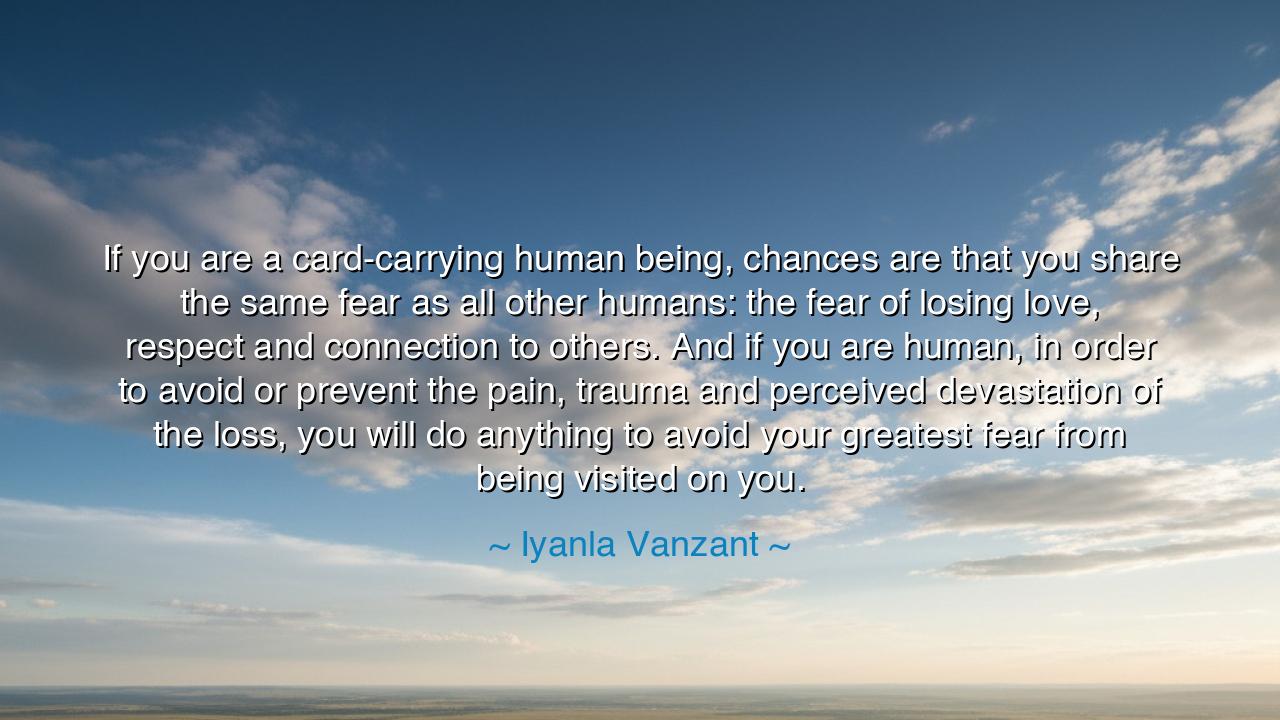
If you are a card-carrying human being, chances are that you
If you are a card-carrying human being, chances are that you share the same fear as all other humans: the fear of losing love, respect and connection to others. And if you are human, in order to avoid or prevent the pain, trauma and perceived devastation of the loss, you will do anything to avoid your greatest fear from being visited on you.






Hear, O children of the heart, the voice of Iyanla Vanzant, who proclaimed: “If you are a card-carrying human being, chances are that you share the same fear as all other humans: the fear of losing love, respect, and connection to others. And if you are human, in order to avoid or prevent the pain, trauma and perceived devastation of the loss, you will do anything to avoid your greatest fear from being visited on you.” These words, though clothed in the softness of human compassion, resound like a bell across the ages. For they reveal the hidden truth that unites all souls: beneath our striving, beneath our pride, beneath even our anger, lies the trembling dread of being unloved and cast aside.
The origin of this saying is rooted in the timeless struggle of human vulnerability. From the earliest tribes that gathered around firelight, survival was not only a matter of food and shelter but of belonging. To be cut off from the circle, to be banished into isolation, was to face death in body and spirit alike. Thus the hunger for connection and the terror of losing it was etched into the marrow of our being. Vanzant, with clarity, names this ancient truth: we may cloak ourselves in wealth, strength, or knowledge, yet the heart beats in fear of separation, longing always for the assurance of love and respect.
History is filled with stories that prove her wisdom. Consider Julius Caesar, conqueror of nations. Though he wielded legions and riches, his downfall came not from foreign enemies alone but from betrayal by his closest companions. The knife wounds struck his body, but the deeper wound was the loss of trust, the loss of connection with those he once embraced as allies. His story, like many, reveals that even the mighty are undone not by famine or fire, but by the breaking of bonds that anchor the human heart.
In our ordinary lives, too, the truth shines forth. Children will shape themselves to win the approval of parents; lovers will betray their own convictions to avoid losing affection; workers will silence their voices to remain accepted among peers. These actions, though sometimes misguided, are born from the same root: the yearning to preserve love, respect, and connection, and the fear of their loss. We endure much, sometimes even diminish ourselves, to avoid this wound, for the shadow of loneliness feels heavier than chains.
Yet Vanzant’s words carry not only recognition but also warning. She reminds us that this fear, left unexamined, can rule us like a tyrant. If we do “anything” to prevent it, we may deceive, betray, or silence our true selves, all in the desperate attempt to hold on to love or respect. But what worth is such connection, if it is built upon the loss of one’s authenticity? Thus, wisdom calls us to both honor our fear and master it, lest we trade our souls for acceptance and still find ourselves alone.
The lesson here is profound: to be human is to long for love, but to be wise is to cultivate it first within. When we anchor ourselves in self-respect and inner connection, the fear of loss loosens its grip. Relationships then become not chains that bind us, but gifts freely chosen. The one who knows their own worth does not beg for scraps of love, but walks in dignity, able to give and receive connection without surrendering their essence.
Therefore, O listeners, let your practice be this: acknowledge your fear, but do not be enslaved by it. Tend to your relationships with sincerity, but also tend to your own soul with compassion. Speak truth even when it risks rejection, for only truth can build lasting connection. Teach others, by your example, that respect begins with self-respect, and that true love cannot be taken by betrayal or absence—it lives within.
Thus let Vanzant’s words endure: all humans fear losing love, respect, and connection—but wisdom lies not in fleeing this fear, but in transforming it. For when you embrace your fear with courage and cultivate your own wholeness, you will no longer do “anything” to avoid loss. Instead, you will walk in freedom, able to give love and receive it, without fear of devastation, for your foundation will rest upon the unshakable truth of who you are.






AAdministratorAdministrator
Welcome, honored guests. Please leave a comment, we will respond soon